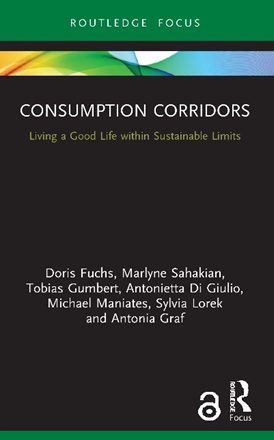


“Consumption Corridors are a powerful instrument for responsibly pursuing the good life in a world of ecological and social limits. Defined by minimum consumption standards allowing every individual to live a good life, and maximum standards guaranteeing the chance to live a good life for others, consumption corridors allow to envision and implement the social change needed to make living well within limits a reality. Minimum consumption standards will ensure that individuals living now or in the future are able to satisfy their needs, safeguarding access to the necessary quality and quantity of ecological and social resources. Maximum consumption standards, in turn, are needed to ensure that consumption by some individuals does not threaten the opportunity for a good life for others. The space between the floor of minimum consumption standards and the ceiling of maximum consumption standards produces a sustainable consumption corridor. It is the space within which individuals may make their consumption choices freely and sustainably” (Fuchs et al., 2021, p. 33).
The concept of consumption corridors was developed as part of a research collaboration of German and Swiss scholars (Blättel-Mink et al. 2011) and has since been elaborated and applied by an increasing number of international efforts (e.g. Special Issue on Consumption Corridors of Sustainability: Science, Practice, and Policy, 2021). It is a focus of extensive ongoing scholarly work due to its promise as a tool for fostering the sustainability transformation. Below we list our contributions to this literature, as well as relevant efforts by others to provide a resource for scholars working on or interested in this field.
Click here to access to the book: https://doi.org/10.4324/9780367748746.
Perspectives
- Kanerva, Minna. 2022. The relationship between consumption corridors and recent sustainability-focused economic models. Perspectives on Consumption Corridors 1, Kanerva 2022 The Relationship Between Consumption Corridors And Recent Sustainability-focused Economic Models
Our Contributions
- Kanerva, Minna. 2022. Consumption Corridors and the Case of Meat. https://link.springer.com/article/10.1007/s10603-022-09524-5.
- Fuchs, Doris, Marlyne Sahakian, Tobias Gumbert, Antonietta Di Giulio, Michael Maniates, Sylvia Lorek and Antonia Graf. 2021. Consumption Corridors: Living Well within Sustainable Limits. London: Routledge. library.oapen.org/handle/20.500.12657/46919.
- Fuchs, Doris, Julia Steinberger, Elke Pirgmaier, William Lamb, Lina Brand-Correa, and Jonathan Cullen. 2021. A corridors and power-oriented perspective on energy service demand and needs satisfaction. Sustainability: Science, Practice and Policy 17(1): 163-173, doi.org/10.1080/15487733.2021.1912907.
- Gumbert, Tobias, and Carolin Bohn. 2021. Are liberal objections to consumption corridors justified? On the relation of freedom and limits in green liberal thought, Sustainability: Science, Practice and Policy, 17:1, 91-102, https://doi.org/10.1080/15487733.2021.1878733.
- Sahakian, Marlyne, Doris Fuchs, Antonietta Di Giulio, and Sylvia Lorek. 2021. Consumption corridors: advancing the concept and exploring its implications. Sustainability: Science, Practice and Policy 17(1): 305-315, DOI: https://doi.org/10.1080/15487733.2021.1919437
- Fuchs, Doris. 2020. „Living Well within Limits: the Vision of Consumption Corridors“. In Kalfagianni, Agni, Doris Fuchs und Anders Hayden (eds). Routledge Handbook of Global Sustainability Governance. London: Routledge, 296-307.
- Jaeger-Erben, Melanie, Birgit Blättel-Mink, Doris Fuchs, Konrad Götz, Nina Langen, Henrike Rau. 2020. Grenzen des Konsums im Lebensverlauf: Gelegenheiten, Hürden und Gestaltungsspielräume GAIA 29/4: 218 – 223, doi.org/10.14512/gaia.29.4.4.
- Fuchs, Doris, Sylvia Lorek, Antonietta Di Giulio and Rico Defila. 2019. „Sources of power for sustainable consumption: Where to look”. in Martiskainen, Mari, Lucie Middlemiss and Cindy Isenhour (eds.). Power and Politics in Sustainable Consumption Research and Practice. London: Routledge, 62-83.
- Fuchs, Doris, and Sophie Dolinga. 2019. Das richtige Maß finden. Wege der Transformation zu nachhaltigem Konsum. AMOS International 13(1): 24-32.
- Fuchs, Doris. 2017. „Consumption Corridors as a Means for Overcoming Trends in (Un-)Sustainable Consumption”. In Bala, Christian and Wolfgang Schuldzinski (eds.). International Conference on Consumer Research 2016: The 21st Century Consumer: Vulnerable, Responsible, Transparent? Düsseldorf: Verbraucherzentrale NRW, 147-159, DOI 10.15501/978-3-86336-918_13.
- Fuchs, Doris and Antonietta Di Giulio. 2016. „Consumption corridors and social justice: exploring the limits.” In Lorek, Sylvia, und Edina Vadovics. (eds.). Sustainable Consumption and Social Justice in a Constrained World. SCORAI Europe Workshop Proceedings, August 29-30, 2016, Budapest, Hungary. Sustainable Consumption Transitions Series, Issue 6.
- Di Giulio, Antonietta and Doris Fuchs. 2014. „Sustainable Consumption Corridors: Concept, Objections, and Responses”. GAIA 23/S1: 184-192.
- Blättel-Mink, B., B. Brohmann, R. Defila, A. Di Giulio, D. Fischer, D. Fuchs, S. Gölz, K. Götz, A. Homburg, R. Kaufmann-Hayoz, E. Matthies, G. Michelsen, M. Schäfer, K. Tews, S. Wassermann and S. Zundel. 2013. Konsum-Botschaften. Was Forschende für die gesellschaftliche Gestaltung nachhaltigen Konsums empfehlen. Stuttgart: S. Hirzel Verlag.
Audio/Video Resources
- Bartz, Michael (2023): 'Rethinking Growth Part 6: The Good Life'. In Over My Head [Podcast]. 9 Juin, [online] https://www.inovermyheadpodcast.com/episodes/rethinking-growth-part-6-the-good-life
Further Publications on Consumption Corridors
- Cué Rio, M., Bovenkerk, B., Castella, JC. et al. 2022. The elephant in the room is really a cow: using consumption corridors to define sustainable meat consumption in the European Union. Sustainability Science. https://doi.org/10.1007/s11625-022-01235-7.
- Kanerva, Minna. 2022. Consumption Corridors and the Case of Meat. https://link.springer.com/article/10.1007/s10603-022-09524-5.
- Kevin Joseph Dillman, Michał Czepkiewicz, Jukka Heinonen & Brynhildur Davíðsdóttir. 2021. A safe and just space for urban mobility: a framework for sector-based sustainable consumption corridor development, Global Sustainability, 4:28, 1-17, DOI: https://doi.org/10.1017/sus.2021.28
- Brand-Correa, Lina, Giulio Mattioli, William Lamb & Julia Steinberger. 2020. Understanding (and tackling) need satisfier escalation, Sustainability: Science, Practice and Policy, 16:1, 309-325, DOI: 10.1080/15487733.2020.1816026
- Coote, Anna. 2021. Universal basic services and sustainable consumption, Sustainability: Science, Practice and Policy, 17:1, 32-46, DOI: 10.1080/15487733.2020.1843854
- Defila Rico & Antonietta Di Giulio. 2020. The concept of "consumption corridors" meets society – how an idea for fundamental changes in consumption is received. Journal of Consumer Policy, 43: 315-344. doi: 10.1007/s10603-019-09437-w
- Di Giulio Antonietta & Rico Defila. (2021, in press): Building the Bridge between Protected Needs and Consumption Corridors. Sustainability: Science, Practice and Policy. doi: 10.1080/15487733.2021.1907056
- Di Giulio A., Defila R. (2021): Sustainable consumption: from environmental concerns to including justice and quality of life. In: Bulletin SAGW 2/21: Konsum | Consommation, SAGW. S. 42-46. doi: http://doi.org/10.5281/zenodo.5013935
- Godin, Laurence, Senja Laakso & Marlyne Sahakian. 2020. Doing laundry in consumption corridors: wellbeing and everyday life, Sustainability: Science, Practice and Policy, 16:1, 99-113, DOI: 10.1080/15487733.2020.1785095
- Gough, Ian. 2020. Defining floors and ceilings: the contribution of human needs theory, Sustainability: Science, Practice and Policy, 16:1, 208-219, DOI: 10.1080/15487733.2020.1814033
- Guillen-Royo, Mònica. 2020. Applying the fundamental human needs approach to sustainable consumption corridors: participatory workshops involving information and communication technologies, Sustainability: Science, Practice and Policy, 16:1, 114-127, DOI: 10.1080/15487733.2020.1787311
- Pirgmaier, Elke. 2020. Consumption corridors, capitalism and social change, Sustainability: Science, Practice and Policy, 16:1, 274-285, DOI: 10.1080/15487733.2020.1829846
- Sahakian; Marlyne & Manisha Anantharaman. 2020. What space for public parks in sustainable consumption corridors? Conceptual reflections on need satisfaction through social practices, Sustainability: Science, Practice and Policy, 16:1, 128-142, DOI: 10.1080/15487733.2020.1788697
- Vladimirova, Katia. 2021. Consumption corridors in fashion: deliberations on upper consumption limits in minimalist fashion challenges, Sustainability: Science, Practice and Policy, 17:1, 103-117, DOI: 10.1080/15487733.2021.1891673
Conferences and Workshops
- 2022, Conference on "Consumption Corridors: Living Well Within Limits" at the conference on Limits to Growth at the Federal Environment Ministry, Doris Fuchs
- 2021, University of Geneva on "Consumption, sufficiency and future imaginaries"
- 2020, International, virtual workshop on Consumption Corridors: Living Well within Limits, WWU Münster
- 2019 International workshop on “Exploring concepts and implications”, organized by Marlyne Sahakian, Manisha Amarantham, Antonietta Di Giulio, Doris Fuchs, Sylvia Lorek and Julia Steinberger, funding provided by the Swiss Nationalfond, University of Geneva, : https://scorai.net/wp-content/uploads/wordpress/Sustainable-Consumption-Transition-Series-Issue-7.pdf.
- 2018 Panel series on “Living well in a world of limits: advances in the study of sufficiency, needs and wellbeing” organized by Antonietta Di Giulio, Doris Fuchs, Sylvia Lorek and Marlyne Sahakian at the conference of the Sustainable Consumption Research and Action Initiative, Copenhagen
- 2016 and 2017 Consumption Corridors, International workshops, WWU Münster
- 2015 Nachhaltiger Konsum und Gerechtigkeit, Internationaler Workshop, WWU Münster
- 2014 Sustainable Consumption and Power, International workshop, WWU Münster
- 2013 Structural Prerequisites for Sustainable Societies and the Good Life, International conference, WWU Münster, organized in collaboration with SCORAI Europe, Proceedings: https://repositorium.uni-muenster.de/document/miami/ aa2a8e28-d81d-4a20-bbb5-a49168e561e7/sgdp_2013_01.pdf.

